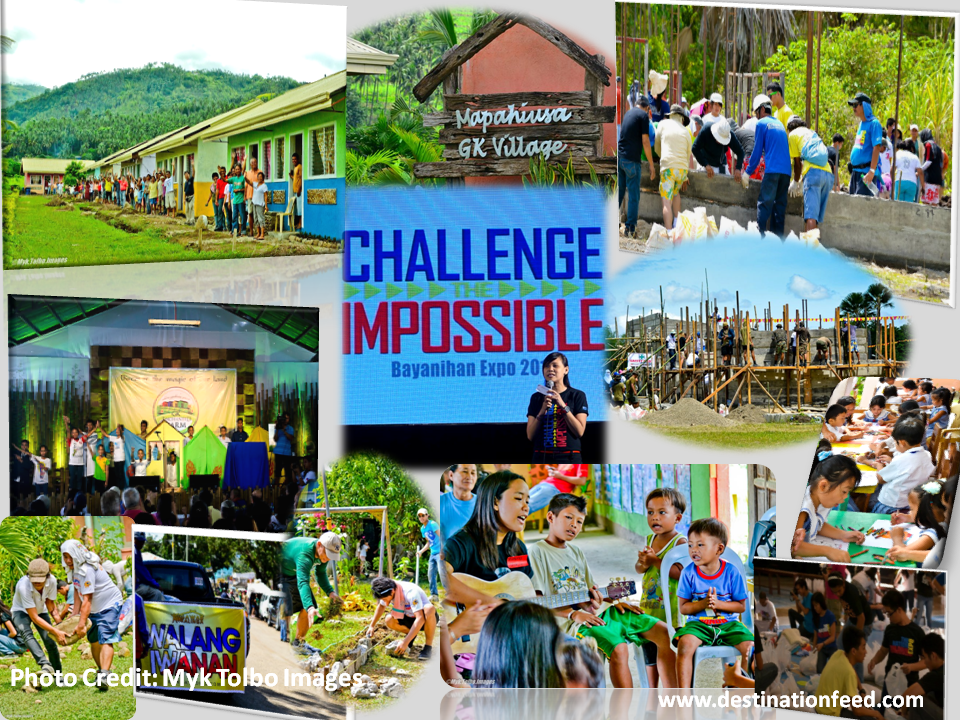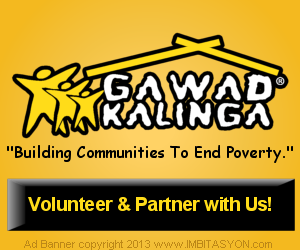Volunteerism in the Philippines found its fertile ground in Gawad Kalinga
It came as no surprise to me to read that the Philippines were a friendly and generous country because Filipinos were frequently giving of themselves through volunteerism. What we may be lacking in material resources never stopped us from sharing what we have plenty of – ourselves.
Filipinos are known to have very close family ties. This feature of our culture is not easily lost even when the family migrates to other countries. Thus, in America where most Filipinos have been migrating to over the last several decades, the sense of family may have been threatened at first but now is stronger than before. This is so because the United States, and some other developed countries where there are Filipino migrants, encourages their citizens not to forget their motherlands.
Strong family ties and the culture of bayanihan make powerful platforms for volunteerism. The sense of family and community, where bayanihan is usually present, prepare the Filipino psyche for volunteerism. I have observed that in many Filipinos as I have observed it in my family and myself. We often practice volunteerism without even thinking it is so. It can start so early in our lives, applied so naturally in our family and extended families, and moves towards our communities –especially during fiestas.
I thought I started volunteering for community service in the early 80’s when my wife and I initiated community projects in a Barangay (native Filipino term for a village or district) in the foothills of Mt. Banahaw. We encouraged cleanliness programs and the growing of flowers in every home to beautify the environment. Later, we moved towards livelihood projects for housewives in the Barangay and connected a network of friends to introduce cottage industries. I did not see it then as volunteering as we were the initiators, but many did volunteer to join our programs simply because we started something.
Yet, I now remember that I had been involved in collective activities where my family had been active from my boyhood. Doing things together is a powerful social habit, especially if we can bring that spirit to an environment larger than our families, even larger than our immediate communities. In other words, more than enough Filipinos are primed to do bayanihan, are prepared to volunteer in causes bigger than themselves.
So it seemed but inevitable that I would meet a movement with a potential greater than I had ever seen before in our country. It also came to pass in the most innocent of ways, triggered by political events that seemed quite independent of the community development work I had fallen in love with. In 2001, I met Tony Meloto and the work he had started, later to be known as Gawad Kalinga. The work per se was not new to me, but the way that Tony was approaching it, the insights and methodologies he shared, and the vision that was all-encompassing completely captured my heart and imagination. It would have been impossible for me to resist being part of it.
I know that there are many who carry a deep love for our people and our nation. It may be that they express it in ways very different from mine, and I have been blessed to discover them and their expressions through Gawad Kalinga. What truly amazes me about the work and vision of Gawad Kalinga is that it can accommodate all ways that try to help the poor and build a strong nation full of dignity and hope. The most ordinary and extraordinary converge in one noble crusade that is deeply rooted in faith and love of country, any faith but only one country.
That must be the essence of a great nation-building movement, that it is all-inclusive and can absorb the good will of all. That must be the foundation of what we know as the common good – that good is common and can be shared by all. In all the years from 2001, I have witnessed all kinds of people, big and small, rich and poor, the most accomplished and the least known, all allowed to participate without judgment or prejudice in the culture of caring, in the practice of sharing, and in putting others before ourselves. In each one, the seed of nobility needs only to find fertile ground.
Gawad Kalinga has been one such fertile ground, guided to harness love of country from the ground up, from those at the bottom being inspired to rise above their inherited circumstance, and from those above the rest to become heroes for those left behind.
There are many who do not understand what Gawad Kalinga really is, and what Gawad Kalinga hopes to become. That lack of intellectual understanding, however, does not limit the intelligent understanding of the heart. What is noble and good come across with little effort when one is shown these via experience, when one joins others in a cause and activities that quickly penetrate the heart.
And that is the view I have of Philippine poverty, which it is a result of broken societal relationships, a cancer that grows from brother and sister Filipino cutting off their ties, their emotional bonds, their collective reality. Only when these broken relationships reach an alarming level can a rich, abundant land host massive poverty. Gawad Kalinga recognizes this and grounds its work on rediscovering our fraternity, our sense of family, and hopefully, builds a nation from one race, one people, one Filipino.
The cause of eradicating poverty in one of the most naturally blessed land in the world is a cause of attaining solidarity among Filipinos, that the pain of the weak is the pain of the strong, that the strength of those who lead us becomes the strength of those who they inspire. The bond of family is but the first platform of Philippine society; from that springs the greater invitation to create the bond of the nation. The sense of family is challenged to give birth to the sense of nation.
Yes, I am a volunteer for a humanitarian cause, and proudly so. I am also a volunteer for nation-building, and more proudly so. For one or for all, the plan of Creation is our togetherness as a people. It is in that togetherness that the higher purpose of our being Filipino will find fulfilment.
______________________________________________________________________________________
Articles Quotes that you can share in FACEBOOK and TWITTER: FACEBOOK: “Doing things together is a powerful social habit, especially if we can bring that spirit to an environment larger than our families, even larger than our immediate communities.” TWITTER: “The seed of nobility needs only to find fertile ground.”______________________________________________________________________________________
 Author: Jose Ma. Montelibano
Writer | Nation Builder
Ateneo de Manila University, 1965-1969
Planters Products. Inc., 1971-1986
Council On Philippine Affairs, Co-Founder: 1999 – Present
TuloyPnoy, Co-Founder: 2009 – present
Gawad Kalinga, Special Projects: 2001 – present
Inquirer.net, Opinion Writer: 2001-present
Connect with Jose Ma. Montelibano at:
Author: Jose Ma. Montelibano
Writer | Nation Builder
Ateneo de Manila University, 1965-1969
Planters Products. Inc., 1971-1986
Council On Philippine Affairs, Co-Founder: 1999 – Present
TuloyPnoy, Co-Founder: 2009 – present
Gawad Kalinga, Special Projects: 2001 – present
Inquirer.net, Opinion Writer: 2001-present
Connect with Jose Ma. Montelibano at:














10:17 am
Another quotable quote:
“The bond of family is but the first platform of Philippine society; from that springs the greater invitation to create the bond of the nation. The sense of family is challenged to give birth to the sense of nation.” – Boy Montelibano, “VOLUNTEERISM IN THE PHILIPPINES”
6:01 pm
Thanks Raoul.
Blessings.